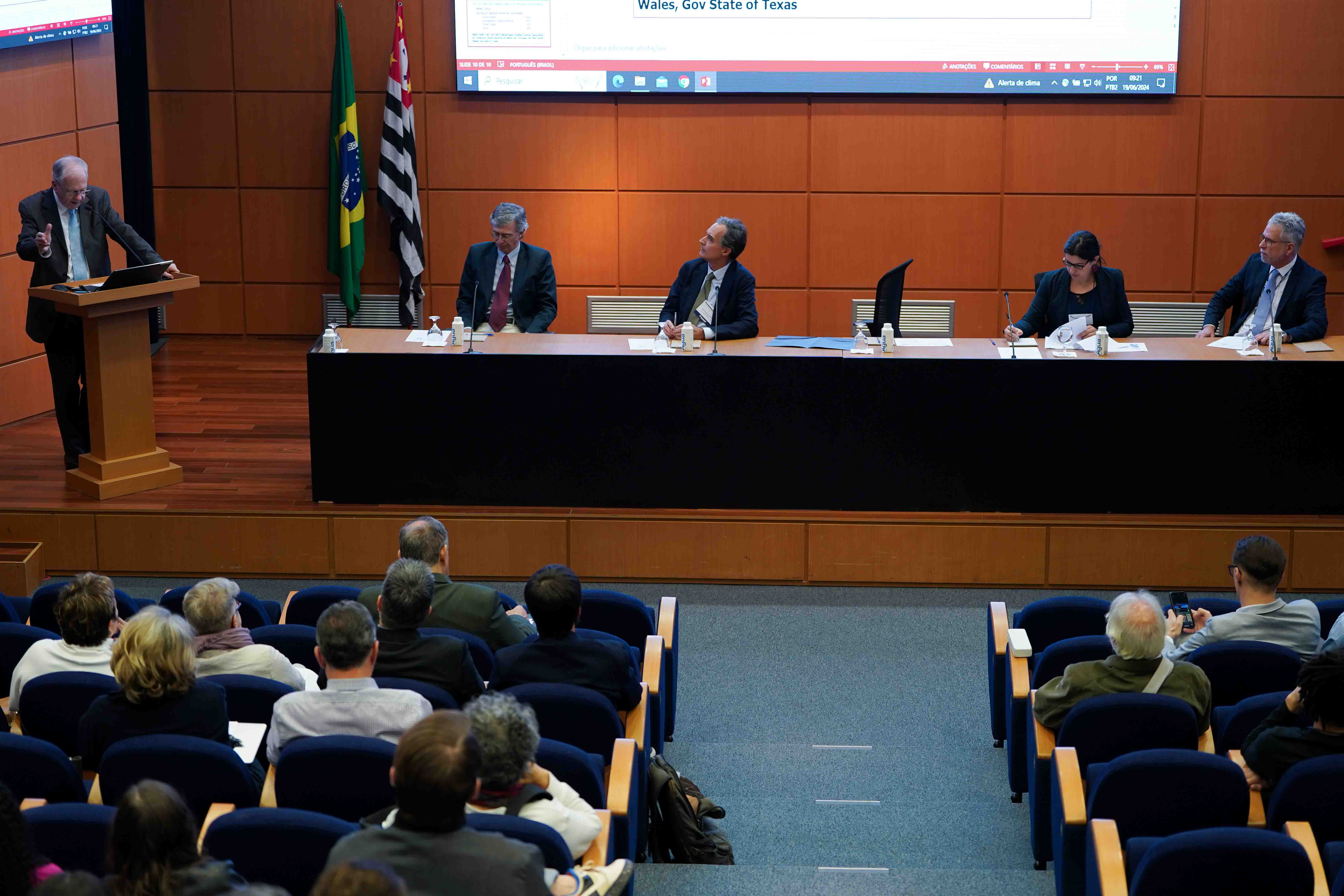


In his opening remarks, Zago noted that scientific collaboration between France and São Paulo resulted in the publication of 14,340 joint articles in science journals between 2012 and 2022. Other speakers included (left to right) Fernando Menezes, Yves Teyssier d’Orfeuil, Sophie Jacquel and Márcio de Castro Silva Filho (credit Daniel Antonio/Agência FAPESP)
Published on 07/08/2024
By José Tadeu Arantes | Agência FAPESP – The Brazil-France Health Workshop was held on June 19-20 at FAPESP to exchange information about the state of research on health in France and São Paulo state, and to explore opportunities for funding joint research projects.
Marco Antonio Zago, President of FAPESP, opened the event alongside Yves Teyssier d’Orfeuil, French Consul General in São Paulo; Sophie Jacquel, Deputy Counselor for Cooperation and Cultural Action at the French Embassy in Brasília; Marcio de Castro Silva Filho, FAPESP’s Scientific Director; and Fernando Menezes, its Chief Administrative Officer.
In his opening remarks, Zago said scientific collaboration between France and São Paulo is “very longstanding and stable,” noting that between 2012 and 2022 it resulted in the publication of 14,340 joint articles in science journals. The impact of the publications is an indicator of the success of this collaboration. The normalized impact of all the scientific articles produced in São Paulo in 2020-22 was 0.94. It was 1.31 for all articles resulting from cross-border collaboration. And for articles produced jointly with France, it was 2.86, significantly higher than the impact of articles produced solely by France, which was 1.45 in the period.
“Looking specifically at collaboration in medical research, we have published more than 200 joint articles per year since 2010,” he noted. The number of joint articles published between 2018 and 2024 was 3,695, with an impact factor of 5.71. Where the collaboration also involved companies, the impact factor rose to 13.34. Where it formed a basis for public policy documents, it was even higher at 20.42. In this period, the main producing institution was the University of São Paulo (USP) and the main funding institution was FAPESP. “So we have a solid foundation on which to build even stronger scientific cooperation,” Zago said.
Two recent events were cited by d’Orfeuil as particularly important cooperation milestones: the creation of Institut Pasteur de São Paulo (IPSP), and the establishment of the Worlds in Transition International Research Center (IRC), sponsored by France’s National Center for Scientific Research (CNRS), USP and FAPESP.
“São Paulo state has an incredible ecosystem of universities, research institutions and cutting-edge laboratories. France is at the forefront of medical research. Its organizations and foundations dedicated to medical research are globally recognized for their excellence, from CNRS and Institut Pasteur to Institut Curie and Gustave Roussy, as well as many university hospitals, etc. In São Paulo, medical research is also very advanced, thanks to the medical schools of the state universities and several research centers, such as the Center for Cell-Based Therapy (CTC), the Hemocentro with a branch of Institut Curie, which we visited this week, and Butantan Institute [linked to the São Paulo State Department of Health]. So there’s huge potential for cooperation between France and Brazil, and more specifically between France and São Paulo,” d’Orfeuil said.
Brazil was considered “one of 12 countries that produce the most science” by the French Ministry for Higher Education, Research and Innovation according to Jacquel, who presented an overview of the many French cultural institutions that are active in Brazil. “The visit by President Emmanuel Macron and his meeting with President Lula gave rise to a new France-Brazil strategic roadmap. In this roadmap, there’s a strong focus on health and especially on the global One Health agenda,” she said.
The French Embassy in Brasília, she added, maintains a vast network of cooperation services, with four “antennas”: São Paulo, Rio de Janeiro, Recife and Belo Horizonte. The priorities are health, sustainable development, climate change and biodiversity, computer science, social science, and humanities. Specifically in the field of health, Brazil is considered a “strategic partner”, both for its proficiency in research on emerging infectious diseases, thanks to the leading role played by Oswaldo Cruz Foundation (Fiocruz, an arm of the Ministry of Health), Butantan Institute and Evandro Chagas Institute in Pará state, and because it faces similar problems to France, such as an aging population and a rise in non-transmissible chronic diseases.
“The strength of French institutions in Brazil, such as Cirad, IRD, CNRS, and now Institut Pasteur de São Paulo, as well as the development of a Pasteur platform in Fortaleza in partnership with Fiocruz, assures a firm foundation for cooperation,” she said.
The workshop also featured an exhibition showcasing the work done in Brazil by CNRS in partnership with USP, and specialized presentations on research projects conducted in such fields as immunology, oncology, infectious diseases and neuroscience. The event closed with a talk by Professor Connie McManus, Manager of Research Collaborations for FAPESP’s Scientific Directorate, on opportunities for funding of partnerships between researchers in France and São Paulo.
A recording of the Brazil-France Health Workshop can be watched in four videos on Agência FAPESP’s YouTube channel.
Source: https://agencia.fapesp.br/52160